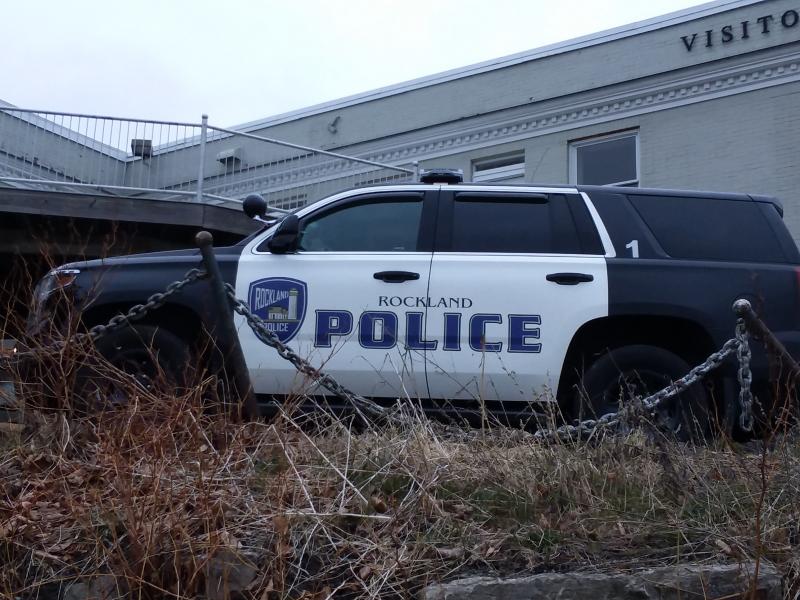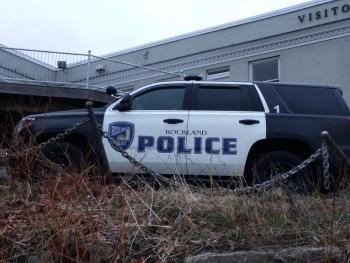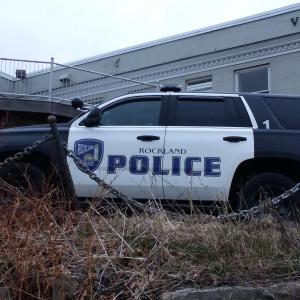Rockland considers questions for future Police Oversight Committee
ROCKLAND – “I know some people are seeing this as an opportunity to revamp the whole entire department, and some people see this as an opportunity for us to take apart a department,” said Mayor Ed Glaser, during the Monday, May 3 agenda-setting meeting of Rockland City Council. “I don’t see it as either one of those things. I see this as an opportunity for us to look at what we have as a police department. Celebrate their strengths, look at their weaknesses, and see how we can aid them to fit Rockland and do a better job for us.”
Rockland City Councilors have opted to form a Community Police Oversight Committee as a way to research and understand the inner workings of its police department. This committee would not be the same as an oversight board, which would have decision-making power, but to ask the questions that have led to many assumptions, and to “slay a whole herd of sacred cows,” as Councilor Nate Davis said.
First, though, Council needs to decide their direction of travel.
Councilor Louise MacLellan-Ruf seeks a pre-committee community workshop where residents can ask their own questions, potentially increasing the lengthy list of questions. (See below).
Councilor Ben Dorr wondered about a pre-committee forum repeating the style of panel-expert Q & A used a few years ago for a Rockland Reentry House forum. Because of pandemic restrictions, the forum might be digital, allowing for experts from different parts of the country to weigh in, according to Dorr.
Councilor Nate Davis wants to provide an option for people to submit questions and concerns anonymously.
But, if forums are instituted, MacLellan-Ruf is against hiring a professional facilitator.
Councilors Sarah Austin is against providing a soapbox for residents to rant without any constructive outcome.
And Glaser wants to immediately start forming the committee, knowing that the ad hoc’s findings will be a year away, and wanting to have those recommendations available before the start of the next budget review.
“This is going to be a challenging conversation,” said Dorr. “And we’re going to be relying on a group of volunteers to engage in a challenging topic, so that anything we can do from the onset, as a Council, to set those people up for success, I think we should take every single step that we can.”
Glaser is calling for questions that the committee can use as a format “to enable the police department to improve in the future.”
Glaser listed his questions:
– Are there areas of cooperation, either county-wide, or with neighboring communities that we should be looking at, that might save us money, or might save us manpower. Or might improve services. Are there things at the Sheriff’s Office that we’re not currently doing that might be better?
– Are there agencies around that we should be working with, for example, drug problems, mental health
– Should there be a standing police review committee. And if so, what would be the mission of that committee? To hear complaints or talk about future policies
–Hiring and recruitment practices. Are we looking at the right places to get new officers– training. Are there other forms of training (on top of what’s already a part of the job) that we want police officers to have
– Budget. I don’t see the budget as the big problem here. There may be ways to help the department within the current budget. Body cams – there may be other things that we don’t have that we might have to pay for. It may not be a matter of cutting money, but of adding money in places that we think it should be put.
–Marginalized issues: mental health, addiction, homelessness, abuse. All things that the police deal with. Are they the agency that should be dealing with that
“When you form a committee like this, you can – certainly – pick people on one side of the issue or the other and get a desired outcome,” said Glaser. “I have no desired outcome, so I would like to see people from all walks of belief on what we should be doing with this police committee, as long as people look like they are reasonable, and have an ability to compromise. I think those are the kinds of people we would like on a committee like this.”
In addition to some of Glaser’s question’s, Davis added the following:
– How can we get Use of Force data, and how does the data compare to other places
– How much do we pay officers, do we pay more?
– What is the complaint process, should there be a civilian oversight board
– How does the police department interact with the social services
– When do officers carry guns, why, and when do they draw them
– How do officers de-escalate, is disengagement an acceptable outcome of some encounters
– Should we hire a traffic control officers, do we want to minimize traffic stops, are there other ways to enforce traffic
“In general, I’m quite enthusiastic, and even excited about this endeavor,” said Davis. “It definitely doesn’t have to be antagonistic towards anyone. The police certainly deserve the same dignity and respect we treat any other department, or any other employees with. That said, I really hope this committee slays a whole herd of sacred cows – again, not in an antagonistic way. I would love to really examine some assumptions.”
Councilor Austin added the following:
– Getting more transparency of data, as opposed to the anecdotes and emotions of people in the community
– Use that data to compare with other communities and reflect upon over time
Councilor Dorr added: “For the size city we are, we provide an exceptional level of service. I think it’s important that we continue to proved an exceptional level of service to our citizens. The most important question is: who’s providing that service, and how can the money in the police budget best be sent. What kind of calls are the police responding to, and are they the appropriate people to be responding?”
According to City Attorney Mary Costigan, during the Council meeting, the City of Portland also has an oversight committee, but are in the process of changing theirs.
From the speaker podium:
Angela McIntyre: I’m excited to see this project start. I approach it not knowing a lot about how our police department functions locally. I have a lot of questions. I really want to know if we collect data reliably regarding race and arrests. And I wonder if there’s any bias shown in our department. The whole state of Maine generally does show bias, but it’s also ….underreported state-wide. I wonder if Rockland also underreports racial data when it comes to arrests. I also really want to understand the budget better about what we’re spending on the police and where that money goes. And I’d really like to center the question: where do people feel supported by the police in our community, and what does that support look like? And once we name that and understand it, going a little deeper and asking ourselves: does that support need to be performed by our police department, or can we empower other parts of the city to support the community in the way the police do?
That involves different ways of thinking, and some imagination.
I’m also very curious about where harm or potential harm happens with our police department. A lot of people have shared stories with me about the Rockland Police Department. They don’t feel comfortable coming forward to simply the town manager or the police department themselves. So, I would really like to know where these stories can go, where they can be honored and really heard, and understood collectively, looking at the bigger problems that they point to, not just individuals who had problems with the police department.
And accountability, where there is harm, what does accountability look like? What are successes there? And what prevents us from keeping police accountable in Rockland?
I’m just very curious about really really understanding how police function in our town.
And also, how do we respond to mental health crisis in Rockland. What things do the police department respond to? Do the police need to be the ones responding? Are they equipped to do that? That’s something I heard a lot about when I was talking to people about police. Wanting better mental health support that perhaps does not come from our police department. And really centering vulnerable people in our community and how they interact with the police. I’d love to center conversations around people recovering from addiction and people dealing with homelessness. People dealing with abuse. And understanding what they’re interactions are with the police. And do people in the community who need support risk arrest when they reach out for help, or are they really supported, they can go to somewhere else besides our police department?
Just really centering vulnerable people and our conversations about policing in Rockland.
Deb Cowan: I just wanted to lend my voice to the police being a very professional people that I’ve dealt with. I’ve had my house broken into a few times. And they’ve done a stellar job to try and keep us safe. They are just human beings, just like the rest of us. They don’t need to have socialized whatever it is that these young ladies seem to think they need. They’ve had training. Sure they can make a mistake. But, golly, why are you just attacking them? You’re attacking them for something they haven’t even done yet. I think you ought to just let the guys go about their training, give them the funding that they need, and move forward with keeping our city safe. If I’m broken into again, I know where to go. Not a social worker. I go to a police officer.
Reach Sarah Thompson at news@penbaypilot.com
See previous article from August 2020: Rockland Council receives petition to defund city police department
Event Date
Address
United States




























